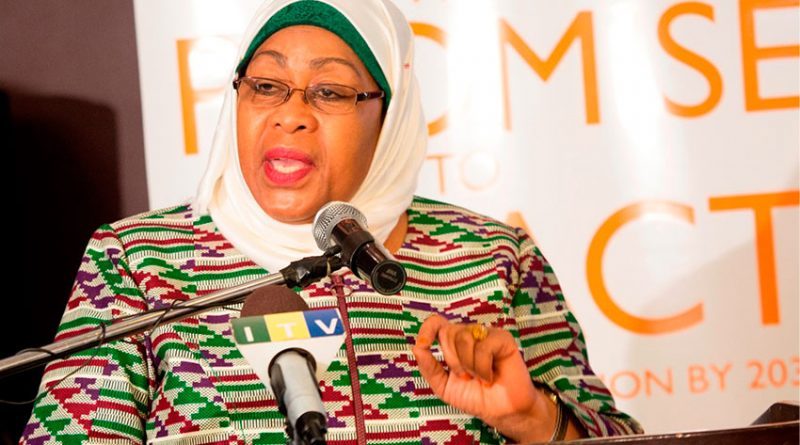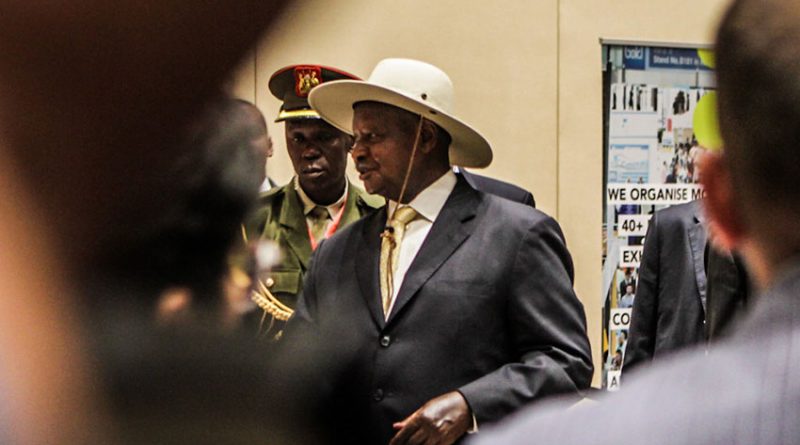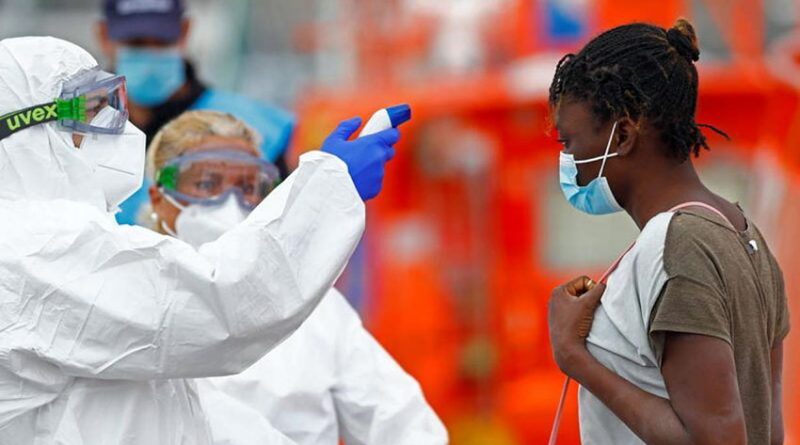TANZANIA’s leadership faced calls for a smooth succession today after president John Magufuli, Africa’s most vehement coronavirus sceptic, died from heart disease following an 18-day absence from public life that drew speculation about his health.
An opposition leader urged the immediate swearing-in of vice president Samia Suluhu Hassan as successor, saying that would avoid a constitutional vacuum and prevent uncertainty.
Magufuli’s death, the first of a Tanzanian leader while in office, opens the prospect that the country will gain its first female president.
The constitution says Hassan, 61, should assume the presidency for the remainder of the five-year term that Magufuli began serving last year after winning a second term.
Hassan addressed the nation on television late on Wednesday, saying Magufuli had died from the heart disease that had plagued him for a decade. She said burial arrangements were underway for the 61-year-old leader but did not indicate when she would be sworn in.
Government spokesman Hassan Abbasi did not respond to calls and texts seeking comment on succession plans.
Magufuli had not been seen in public since Feb. 27, sparking rumours he had COVID-19. On March 12, officials denied he had fallen ill and on Monday Hassan had urged Tanzanians not to listen to rumours from outside the country.
As late as Wednesday, she sent ‘greetings’ from Magufuli in remarks to an audience in the coastal region of Tanga.

“The VP has to be sworn in immediately,” opposition leader Zitto Kabwe told Reuters by phone from Dar es Salaam. “The constitution doesn’t allow a vacuum … I will be concerned if the day passes without her being sworn in.”
A source who advises businesses operating in Tanzania said “The next 48 hours are crucial … There is likely to be uncertainty. Some people will want to purge some Magufuli hardliners, but given how he restructured the intelligence services, that is easier said than done.”
OPPOSITION
Nicknamed “The Bulldozer” because of his reputation for pushing through policies despite opposition, Magufuli drew international criticism for his unorthodox and increasingly authoritarian tactics.
Although Hassan publicly championed Magufuli’s leadership style and frequently represented him abroad, she has been more soft-spoken and less confrontational than the president.
“The Vice President hasn’t given the impression of significant popularity or influence within the (ruling party),” said Fergus Kell, Africa analyst at the Chatham House think-tank in London. “This could throw up some potential challenges in terms of managing competing interests and generating the required support within the ruling party to govern effectively.”
Magufuli was a vocal COVID-19 sceptic who urged Tanzanians to shun mask-wearing and denounced vaccines as a Western conspiracy, frustrating the World Health Organization.
Traffic moved normally on Thursday morning and there was not a heavy security presence in Dar es Salaam, the country’s biggest city, a Reuters witness said.
Some people stood on street corners in the downtown area reading newspapers including a headline blaring “Grief” and wept. As has been the case throughout the pandemic in Tanzania, many people were not wearing face masks.
Tundu Lissu, Magufuli’s main rival in the October election when the president won a second term, said in an interview with Kenya’s KTN that it was time for the country to open a new chapter after Magufuli “caused havoc to our country.”
East African governments offered condolences, but some people from the region were critical of his stance on COVID-19 and his leadership style. “It has been a horrendous 5 years in #Tanzania,” tweeted Tanzanian lawyer Fatma Karume.
Source -The African Mirror
SOUTH Africa’s drugs regulator SAHPRA said yesterday that it had approved a “section 21” emergency use application for the COVID-19 vaccine developed by Pfizer and BioNTech.
SAHPRA added in a statement that the approval was subject to further efficacy and safety surveillance of the vaccine in the country, including monitoring its efficacy against the dominant local coronavirus variant.
South Africa is the hardest-hit country on the African continent in terms of recorded coronavirus cases and deaths and suffered a severe second wave of infections driven by the more infectious 501Y.V2 variant, first identified late last year.
It kick-started its vaccination campaign with Johnson & Johnson’s one-dose vaccine last month in a research study targeting up to 500,000 health workers.
But it has so far administered only 150,000 doses of the Johnson & Johnson vaccine, lagging wealthier nations on other continents that have already vaccinated millions of their citizens.
The government says it has secured 20 million doses of the two-dose Pfizer-BioNTech vaccine in bilateral negotiations, with deliveries ramping up from the second quarter of the year.
It also hopes to receive 117,000 doses of the Pfizer-BioNTech vaccine before the end of the month from the COVAX Facility, the global vaccine distribution scheme co-led by the World Health Organization and partners including the Gavi vaccines alliance.
Source – Thomson Reuters Foundation
UGANDA’S President Yoweri Museveni has said he has not yet been vaccinated against COVID-19 because he is “careful” and is still weighing which jab to take, days after the East African country began its inoculation campaign.
The apparent hesitation may fuel already significant vaccine scepticism in the country, which is in the earliest stages of its roll out of the jab. Many African countries have struggled to get doses and have not administered a single shot.
Uganda began vaccinating health workers and the elderly last week after receiving 864,000 doses of AstraZeneca vaccine from COVAX, the World Health Organisation-backed programme to provide vaccines to poor and developing countries.
At 76 years old, Museveni is eligible to be vaccinated.
But in a televised address late on Sunday, the president demanded an apology from the country’s largest independent local paper, Daily Monitor, which reported last month that Museveni and some relatives have been vaccinated.
“The reason I have not been vaccinated is first of all I am quite careful,” Museveni said, adding the vaccine rollout was starting with highly vulnerable people like health workers. “I am also looking at which of the vaccines should I go for.”
Like much of Africa, with the notable exception of South Africa, Uganda has recorded a comparatively mild outbreak of COVID-19, with infections so far totalling about 40,500 and 334 recorded dead, according to official statistics.
The nation of 42 million people imposed strict measures shortly after recording its first COVID-19 case, and while most of the strict measures have since been eased, some like an overnight curfew and closures of bars remain.
Museveni’s hesitancy was likely to encourage “extreme vaccine pessimism” among Ugandans, Peter Mwesige, co-founder of a local think-tank, said in a tweet.
In addition to the about 3.5 million doses in total that Uganda hopes to receive from COVAX, the government says it has also ordered 18 million doses of AstraZeneca from the Serum Institute of India and that up to 40% of that order is expected to arrive by the end of March. The Serum Institute of India told Reuters at the time that it had not yet signed any deal with Uganda.
The Ugandan leader was speaking two days after officials in neighbouring Tanzania insisted President John Magufuli is in good health and working normally, following reports he was in critical condition with COVID-19 and receiving treatment abroad.
Magufuli, 61, is Africa’s most prominent coronavirus sceptic. He has not been seen in public since Feb. 27.
On Monday Tanzania’s vice president, speaking while on an official trip in the country’s north, urged Tanzanians not to listen to rumours from outside the country.
“I would like to assure you Tanzania is safe,” Samia Hassan Suluhu said. She added, without elaborating: “It is normal for a human being to be checked with flu, fever … anything else.”
Source – Thomson Reuters Foundation
FROM Australia to Egypt, migrants and refugees have been especially hard hit by job losses and economic pain during the coronavirus pandemic, with many struggling to access healthcare and state aid, a survey showed on Tuesday.
The survey, published in a report by the Red Cross Red Crescent (RCRC) Global Migration Lab, included 3,250 interviews with migrants in eight countries – Australia, Colombia, Egypt, Ethiopia, the Philippines, Sudan, Sweden and Britain.
Migrant workers are over-represented in hard-hit sectors such as food production and hospitality, meaning they have been disproportionately affected by layoffs and wage losses linked to COVID-19, the report said.
Migrants also make up a significant share of key workers in healthcare, scientific research, food supply chains, and those making personal protective equipment (PPE).
Yet the pandemic has led to the “intentional exclusion of migrants from COVID-19 prevention and support programmes”, such as government cash transfers, the report said.
In Australia, nearly 90% of migrants surveyed online said they were financially worse off because of the pandemic, while in Egypt, nearly 80% said their income had fallen by between 70% and 100% due to COVID-19 restrictions.
In Africa’s Sahel region, some migrants without work prior to the pandemic have resorted to begging and most were not able to make enough money to cover their basic needs, the survey found.
“Our research reveals what we are calling an ‘invisible wall’ that has blocked migrants – particularly those undocumented or in an irregular situation – from accessing basic services,” Jagan Chapagain, secretary-general of the International Federation of Red Cross and Red Crescent Societies, (IFRC) said in a statement.

Some nations, including Qatar, Saudi Arabia, Malaysia and Britain, have introduced measures to ensure migrants – regardless of their immigration status – have free access to COVID-19 testing and screening, the report noted.
But elsewhere, migrants have been unable to access COVID-19 care because they do not have a national identity or social security number.
This barrier is likely to also affect access to vaccinations even if migrants are eligible by law to receive coronavirus jabs, the report warned.
“The inclusion of migrants into national COVID-19 policies does not necessarily translate into inclusive and effective access in practice,” Chapagain said.
In some countries, migrants need to register online to get COVID-19 vaccinations, which can exclude some due to their limited internet access and language barriers, the report said.
It also said migrants reported being hesitant to consult a doctor, seek treatment, and register for the COVID-19 vaccine due to fears of disclosing information that may be shared with immigration authorities to arrest, detain or deport them.
Source – Thomson Reuters Foundation




